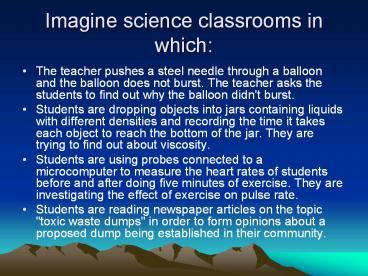Imagine science classrooms in which: - PowerPoint PPT Presentation
1 / 10
Title:
Imagine science classrooms in which:
Description:
Inquiry is a term used in science teaching that refers to a way of questioning, seeking knowledge or information, or finding out about phenomena. – PowerPoint PPT presentation
Number of Views:178
Avg rating:3.0/5.0
Title: Imagine science classrooms in which:
1
Imagine science classrooms in which
- The teacher pushes a steel needle through a
balloon and the balloon does not burst. The
teacher asks the students to find out why the
balloon didn't burst. - Students are dropping objects into jars
containing liquids with different densities and
recording the time it takes each object to reach
the bottom of the jar. They are trying to find
out about viscosity. - Students are using probes connected to a
microcomputer to measure the heart rates of
students before and after doing five minutes of
exercise. They are investigating the effect of
exercise on pulse rate. - Students are reading newspaper articles on the
topic "toxic waste dumps" in order to form
opinions about a proposed dump being established
in their community.
2
What is Inquiry?
- "Inquiry is the set of behaviors involved in
the struggle of human beings for reasonable
explanations of phenomena about which they are
curious." (Novak 1964) So, inquiry involves
activity and skills, but the focus is on the
active search for knowledge or understanding to
satisfy a curiosity. - A focus on inquiry always involves, though,
collection and interpretation of information in
response to wondering and exploring.
3
What is Inquiry?
- It is the scientific process by which knowledge
is generated and validated. In this process the
learners are confronted with a problem- a
discrepancy or a puzzle for which a solution is
not obviously evident- and by gathering
information, they generate ideas of the
explanation and subsequently test them to assess
their usefulness. - It is not discovery of an answer that is taken
out from the text book but rather the development
of an answer by the learner based on the result
of the investigation. - Inquiry is a term used in science teaching that
refers to a way of questioning, seeking knowledge
or information, or finding out about phenomena.
4
A pedagogical perspective
- Inquiry-oriented teaching is often contrasted
with more traditional expository methods and
reflects the constructivist model of learning,
often referred to as active learning, so strongly
held among science educators today. According to
constructivist models, learning is the result of
ongoing changes in our mental frameworks as we
attempt to make meaning out of our experiences
(Osborne Freyberg, 1985). - In classrooms where students are encouraged to
make meaning, they are generally involved in
"developing and restructuring their knowledge
schemes through experiences with phenomena,
through exploratory talk and teacher
intervention" (Driver, 1989). Indeed, research
findings indicate that, "students are likely to
begin to understand the natural world if they
work directly with natural phenomena, using their
senses to observe and using instruments to extend
the power of their senses" (National Science
Board, 1991, p. 27).
5
A pedagogical perspective
- In its essence, then, inquiry-oriented teaching
engages students in investigations to satisfy
curiosities, with curiosities being satisfied
when individuals have constructed mental
frameworks that adequately explain their
experiences. One implication is that
inquiry-oriented teaching begins or at least
involves stimulating curiosity or provoking
wonder. There is no authentic investigation or
meaningful learning if there is no inquiring mind
seeking an answer, solution, explanation, or
decision.
6
Principles of Inquiry Learning
- Intrinsic motivation is basic to inquiry
- Process oriented rather than content oriented
- conceptual rather than factual
- It is student centered
7
The phases of Inquiry teaching
- Defining a problem
- It assumes learning begins with a dilemma, puzzle
or a problem bothering the learner. The questions
or problems should be in researchable forms
rather than precise terms. - Eg. How does access to internet affect learning
of SCE students?
8
The phases of Inquiry teaching
- Formulating hypothesis
- Hypothesis is an unverified generalization.
Hypothesis generation may be done by
brainstorming generate ideas to analyze and
prioritize - They make meaningful guesses to the problems in
the light of their experiences and data available
to them.
9
The phases of Inquiry teaching
- Gathering data
- The data is gathered to either support or refute
hypothesis. Some of the ways of gathering data
are surveys, case study, interviews, field trips,
questionnaires. - Testing the validity of the hypothesis
- The data gathered is analyzed to test the
validity of the hypothesis. Those hypotheses
which are supported by adequate evidences are
checked and accepted. The hypotheses which are
not supported by adequate evidences are refuted
or studied further
10
The phases of Inquiry teaching
- Generalizing or drawing Conclusion
- Baesd on the accepted hypothesis students will
generalize stating the solution to the problem
encountered. This generalization is not the final
truth but is tentative and subject to change. - Applying the Solution/Generalization/Conclusion
- The teacher can guide the students so that they
may resolve to apply the solution to new learning
situations or in their day to day life
experiences































